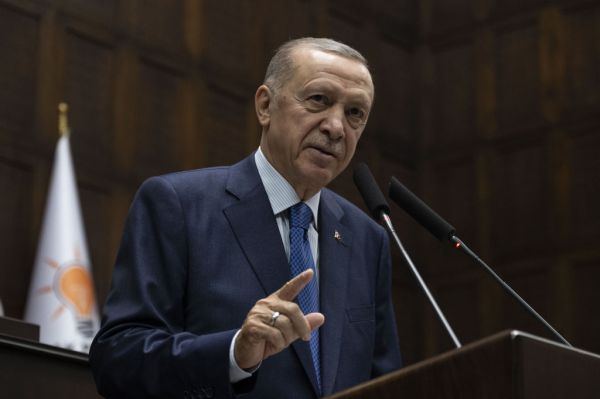Turkish President Recep Tayipp Erdoğan is likely to be reelected to another term on Sunday despite widespread speculation that he might lose. He has already ruled the Turkish Republic for almost a decade longer than its founder, Mustafa Kemal Atatürk, and his victory at the polls will undoubtedly keep Turkey on its increasingly nationalist and authoritarian trajectory. As a result, it is worth reflecting on why he appears to have defied the odds and what his likely victory means for Turkey’s future course at home and abroad.
Why did people think Erdoğan was vulnerable in the election?
Erdoğan appeared vulnerable because he had thoroughly mismanaged the economy (45 percent inflation, down from 80 percent in the fall), COVID response, and earthquake relief. Moreover, he was personally associated with Turkey’s Syria policy, which had brought more than 4 million Syrian refugees into Turkey. Those refugees have become a target of popular anger as economic conditions in Turkey have worsened. Not to mention that corruption in the ranks of his Justice and Development Party (AKP)—including up to and including the president’s family—as well as his increasing authoritarianism suggested that he was more vulnerable than at any time in his 20-plus years ruling Turkey. Polling for the first round of the election on May 14 suggested that he was running behind all of the prospective candidates; even Kemal Kılıçdaroğlu—generally considered the weakest potential opponent—had been outstripping him in trial heats. After the earthquake in February, some polls showed Erdoğan behind by as much as 10 to 12 percent. No one has ever made money betting against Erdoğan in Turkish politics, but his vulnerabilities were undeniable.
How did he best Kılıçdaroğlu in the May 14 balloting?
The voting, however, told a different tale, suggesting that Erdoğan’s brand of Islamo-nationalist populism remains a winning formula in a deeply polarized and divided society. His unorthodox monetary policy (which has featured Erdogan pressuring the Central Bank over several years to lower interest rates even as inflation has been rising) has damaged the Turkish economy and the livelihoods of the Turkish population, but he has maintained enough fiscal discipline to keep the entire economy from crashing while preserving his ability to throw money at voters around election cycles (note the 45 percent pay increase for government worker announced just days before the voting, or the promised housing subsidies after the earthquake). Low interest rates have also kept the spigot of cheap credit open to his constituency despite the overall baleful influence on the country’s current account.
Erdoğan demonstrated once again that he is an incredibly skilled populist demagogue who excels at channeling the grievances of voters, particularly pious Muslims in Turkish “flyover” country (central Anatolia) against globalist elites. This conjuring trick is all the more impressive since Erdoğan has been in power for two decades and has spent most of the last 10 years systematically concentrating more and more political power in his own hands. He has created a personalist political system in which almost nothing of consequence can be decided without his say. Since Turkey is split pretty much evenly along sociocultural and political lines, his base mobilization strategy against a fairly feckless opposition remains a winning formula: A narrow plurality of Turks would rather see continuity than change in Turkish governance.
Why do people believe he will win on Sunday?
He is likely to win because the opposition appears to have peaked. Two polls on the eve of the May 14 election showed Kılıçdaroğlu leading Erdoğan with more than 50 percent of the vote and therefore unlikely to face a second-round runoff against the incumbent. Then Erdoğan outpolled Kılıçdaroğlu by nearly 3 million votes and almost hit the 50 percent mark himself.
The AKP used the power of incumbency to slow down the vote count in urban areas (always likely to be Kılıçdaroğlu’s bastion of electoral strength) enabling him to go out on his balcony and make a speech claiming victory. His befuddled opponents waited until 2 a.m. to make a public statement, and their body language conveyed the disappointment and deflation that accompanied Erdoğan’s surprisingly strong showing. Kılıçdaroğlu ran nearly 20 points ahead of his Republican People’s Party’s vote in the concurrent parliamentary election, but it seems unlikely given the prevailing environment that he can mobilize his voters at the same level on Sunday. It seemed, in the aftermath of the first round, that the opposition coalition (Table of Six) had no “Plan B” for fighting a two-week runoff campaign, and Kılıçdaroğlu has been reduced to ultranationalist sloganeering and attempts to demonstrate he will be tougher on the refugee population in Turkey than Erdoğan. It hardly seems a likely recipe for success.
Moreover, since Erdoğan’s governing coalition of the AKP and the Nationalist Movement Party (which significantly overperformed the pre-election polls in the parliamentary voting) has won 322 seats in the 600-seat Grand National Assembly, Erdoğan is running against “divided government.” That message is likely to resonate with Turkish voters who have unpleasant associations with the unstable coalition governments of the 1990s, when Turkey was a parliamentary democracy rather than the autocratic presidentialist system of today.
Finally, and perhaps most importantly, it is important to remember a point underscored by the election monitoring report of the OSCE/Council of Europe parliamentary assembly experts, who noted that while the election was “free” (although marred by some ballot box chicanery that even the opposition admits would not have changed the results on May 14), it was not fair since the legal, political, and media environment is tilted so heavily in Erdoğan’s favor. In the run-up to the election, Erdoğan received 32 hours of coverage while Kılıçdaroğlu received 32 minutes!
What are the likely policy consequences?
Assuming Erdoğan wins, the country will remain an unreliable NATO ally with a foreign policy subject to the whims of an increasingly empowered autocrat. Erdoğan will see this triumph over political and economic adversity as vindication of the course he has set, and he will double down on his policy initiatives. He will continue to maintain a delicate balancing act with his “competimate” Vladimir Putin—providing some military assistance to Ukraine while maintaining Turkey as a venue for sanctions evasion and emphasizing his role as a potential mediator/facilitator for the continuation of the Black Sea grain deal as well as potential ceasefire or armistice.
He will stick with his purchase of the Russian S-400 air and missile defense system while continuing to use his blockade of Sweden’s candidacy for NATO membership as trade bait to extract concessions from the U.S. and the West—maybe a bilateral meeting with Biden at the NATO summit in July, or steps by the administration toward a sale of F-16s to Turkey, or Swedish arms sales to mark the end of Stockholm’s arms embargo on Turkey.
Tensions with Greece, stoked by Erdoğan before the February earthquakes, have receded, and with Erdoğan and Greek Prime Minister Kyriakos Mitsotakis both safely re-elected, one can hope that the situation will stay calm. But Erdoğan definitely wants to win access to the Eastern Mediterranean Gas Forum (from which he has been heretofore excluded) and I would wager that he concludes he can threaten his way into it.
Finally, Erdoğan’s big challenge will remain the economy, which has been subject to his politically and ideologically driven interventions for a decade and a half. There is no indication that he has any intention of yielding to what he derisively calls the “interest rate” lobby, but he will still have to deal with some $220 billion in external financing needs, a $50 billion current account deficit, $150 billion or so in short term debt, and central bank reserves that have been severely depleted by repeated efforts to prop up the Turkish lira. Under normal circumstances this would result in Turkey seeking IMF assistance, but that assistance would obviously come with conditions and likely a demand to increase interest rates. Alternatively, Erdoğan could try to get outsiders to fund some of his needs, but Russia is now consumed with its own economic problems and the Gulf states would likely demand increased interest rates as well. It seems most likely that Erdoğan will try to muddle through as he has successfully since the Great Recession. Whether he can successfully fend off a massive economic crisis remains to be seen.








Please note that we at The Dispatch hold ourselves, our work, and our commenters to a higher standard than other places on the internet. We welcome comments that foster genuine debate or discussion—including comments critical of us or our work—but responses that include ad hominem attacks on fellow Dispatch members or are intended to stoke fear and anger may be moderated.